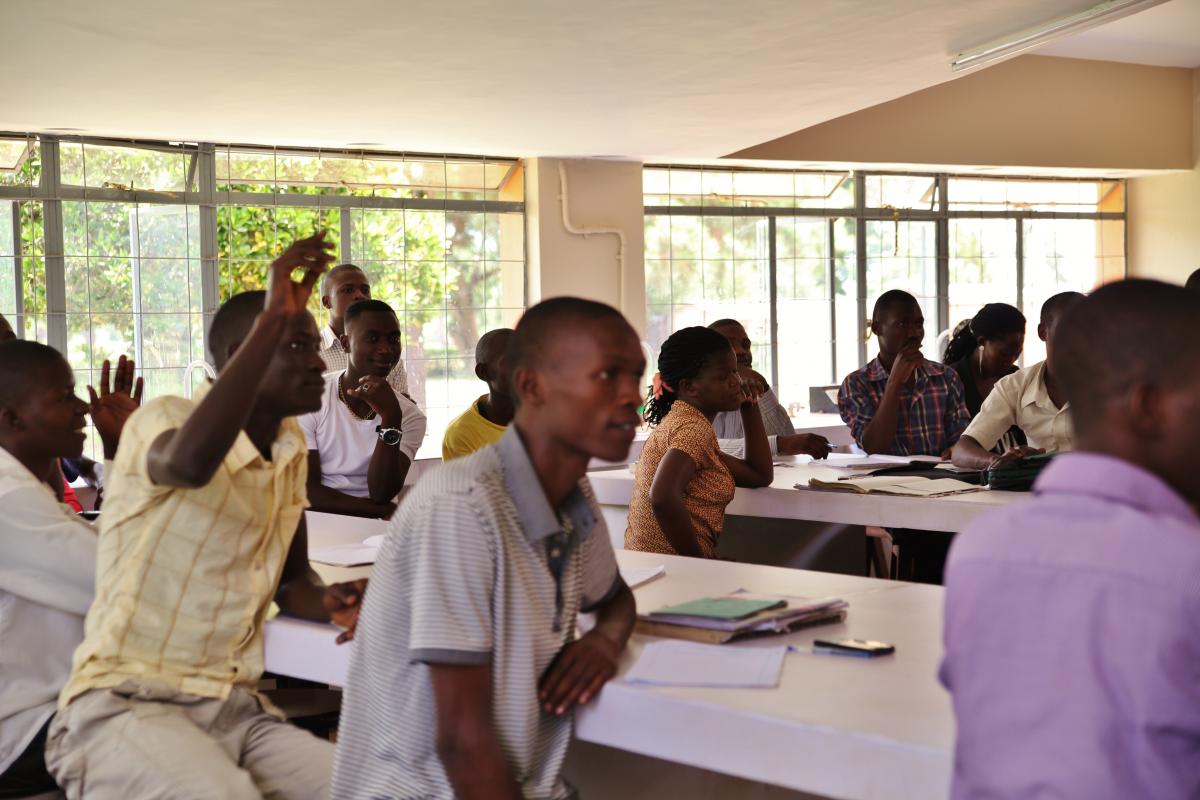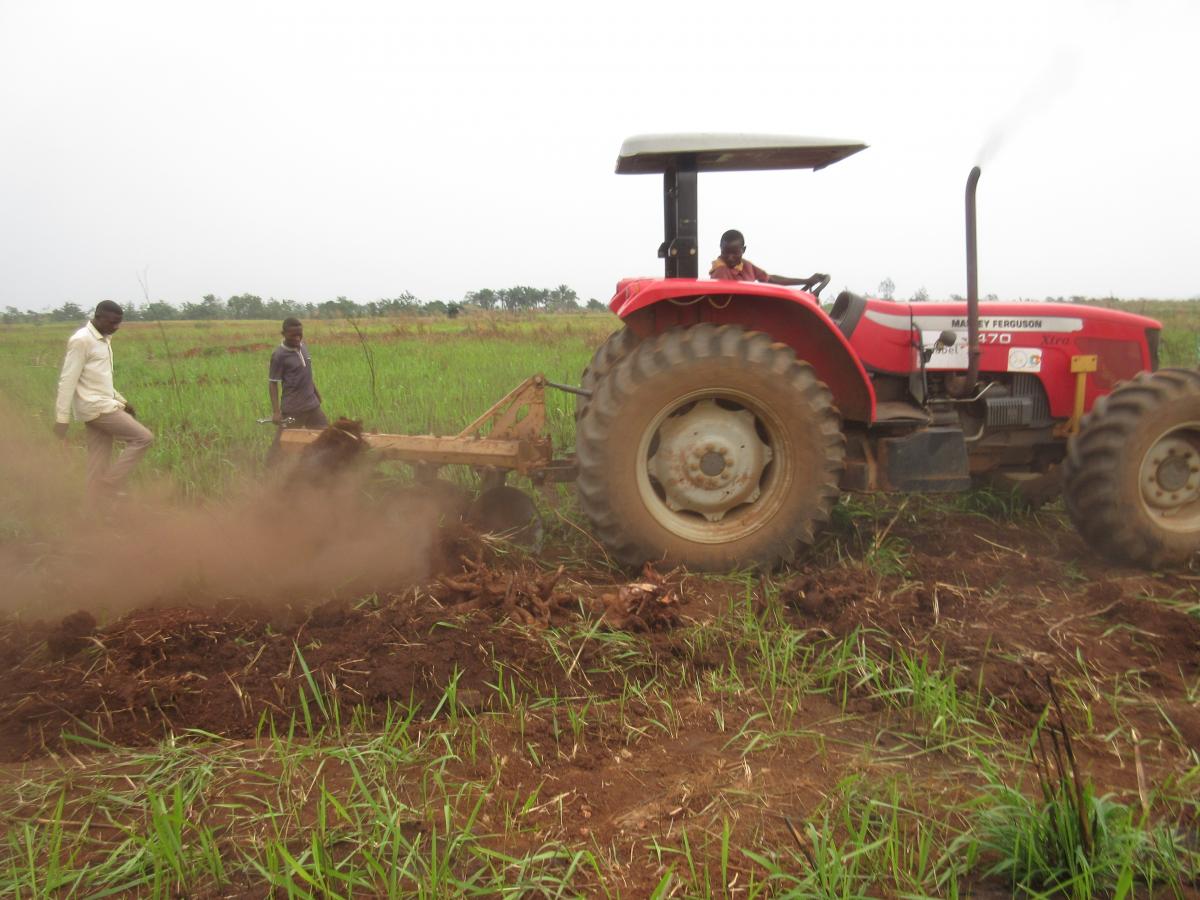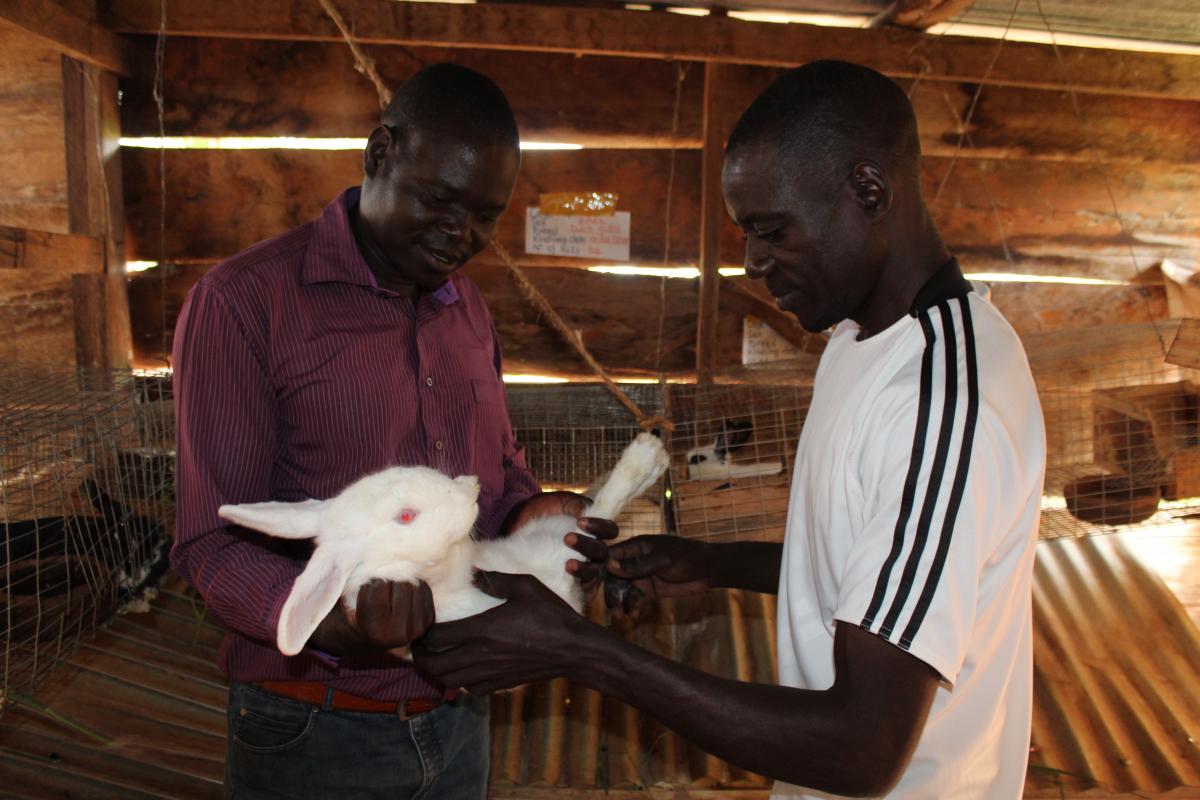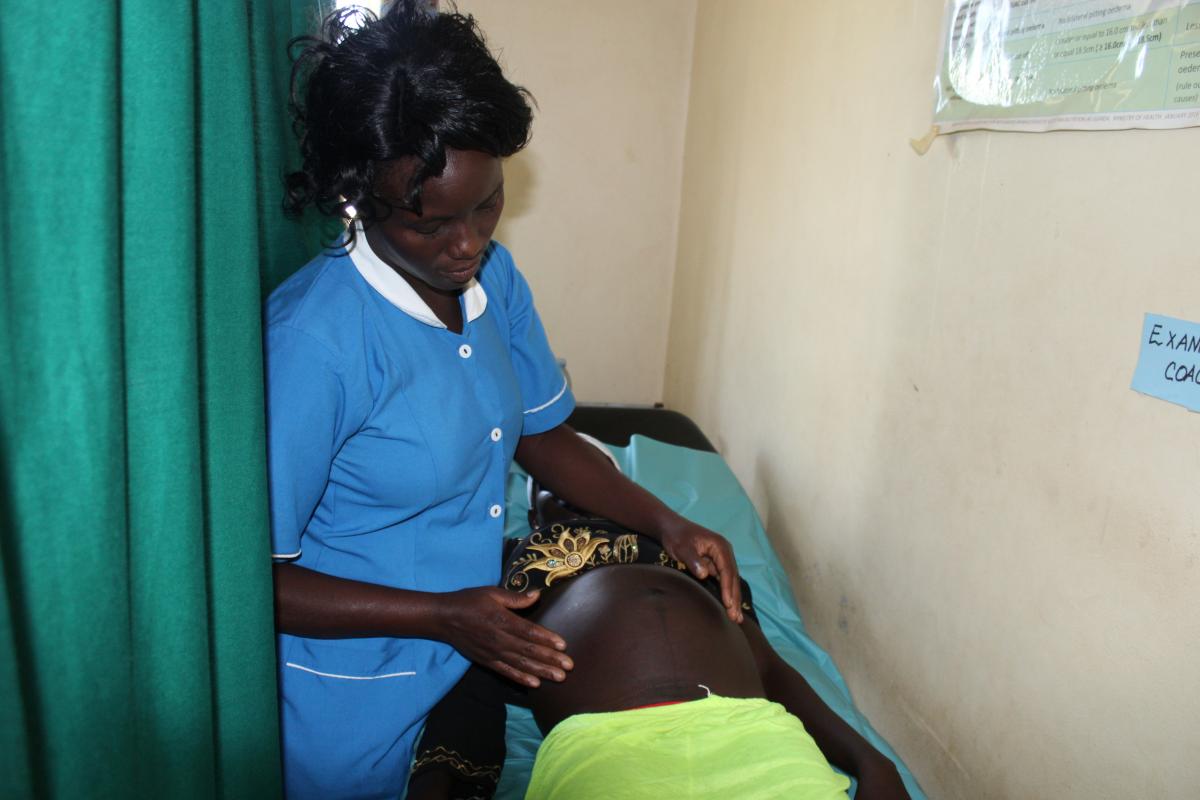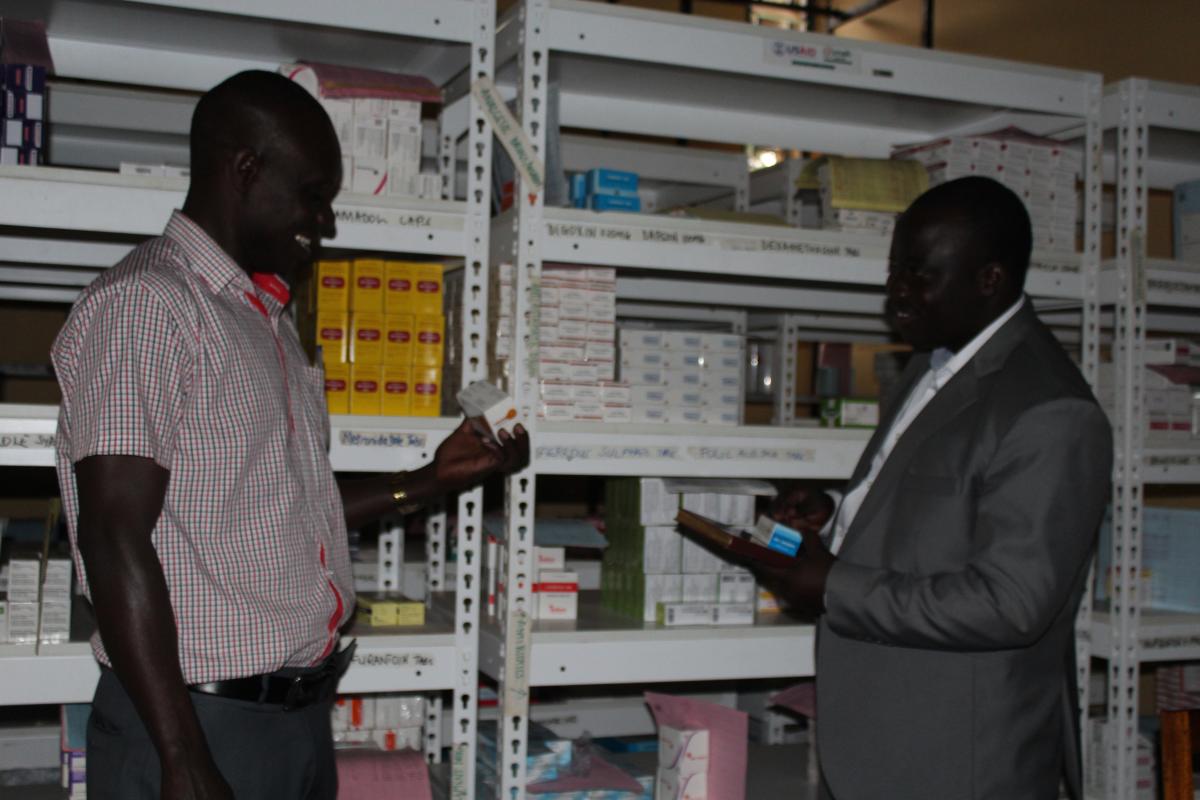Search
Viewing 1860 to 1875 of 2520 news
-
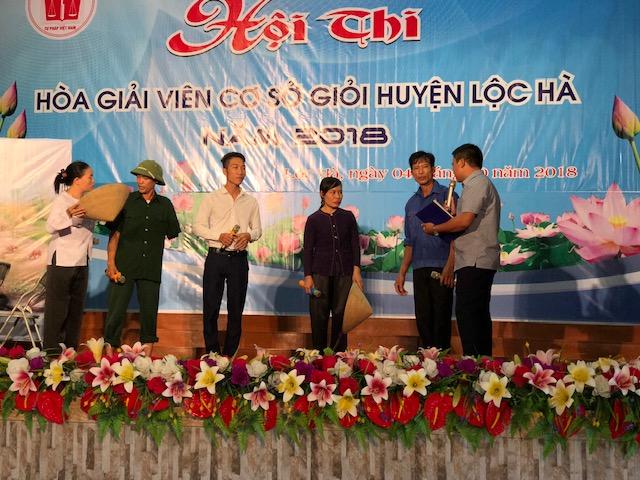
Contest on good local governance for community mediators
Marion FISCHER | 22/10/2018
Civil servants and community mediators of Ha Tinh province held a contest on understanding and implementing public administration reform in Ha Tinh city on 5th October 2018. In the first phase of the contest, the civil servants demonstrated their knowledge of the laws, decrees and regulations which shape the public administration reform. In the second phase, they staged plays about how difficulties and problems of the citizens can be solved better through the reform of public administrative services and through the close cooperation with people's civil society organizations. Contestants showed good understanding of the goals and action steps of public administration reform and displayed their full support for the cause.
-
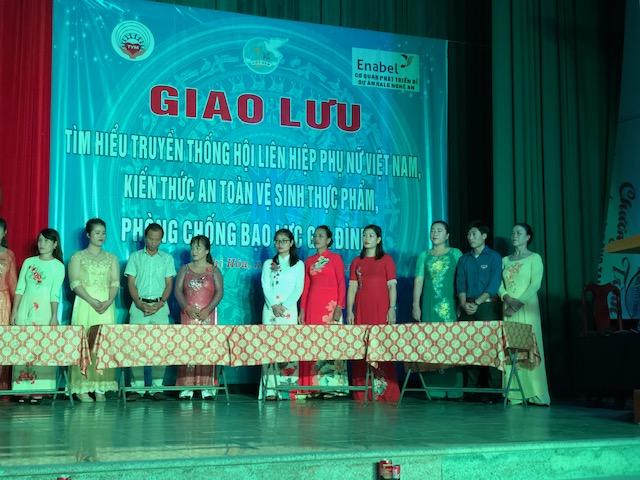
Contest on understanding government regulations
Marion FISCHER | 22/10/2018
In Cua Lo town, Nghe An province, public servants held a contest on understanding an implementation of government regulations on food safety and hygiene in tourism facilities on 4th October 2018. The contestants showed their full understanding of the decrees and regulations in a multiple choice test. After the test the teams staged plays about the application of the standing laws in colorful performances with great enthusiasm and effective outreach to the public.
-
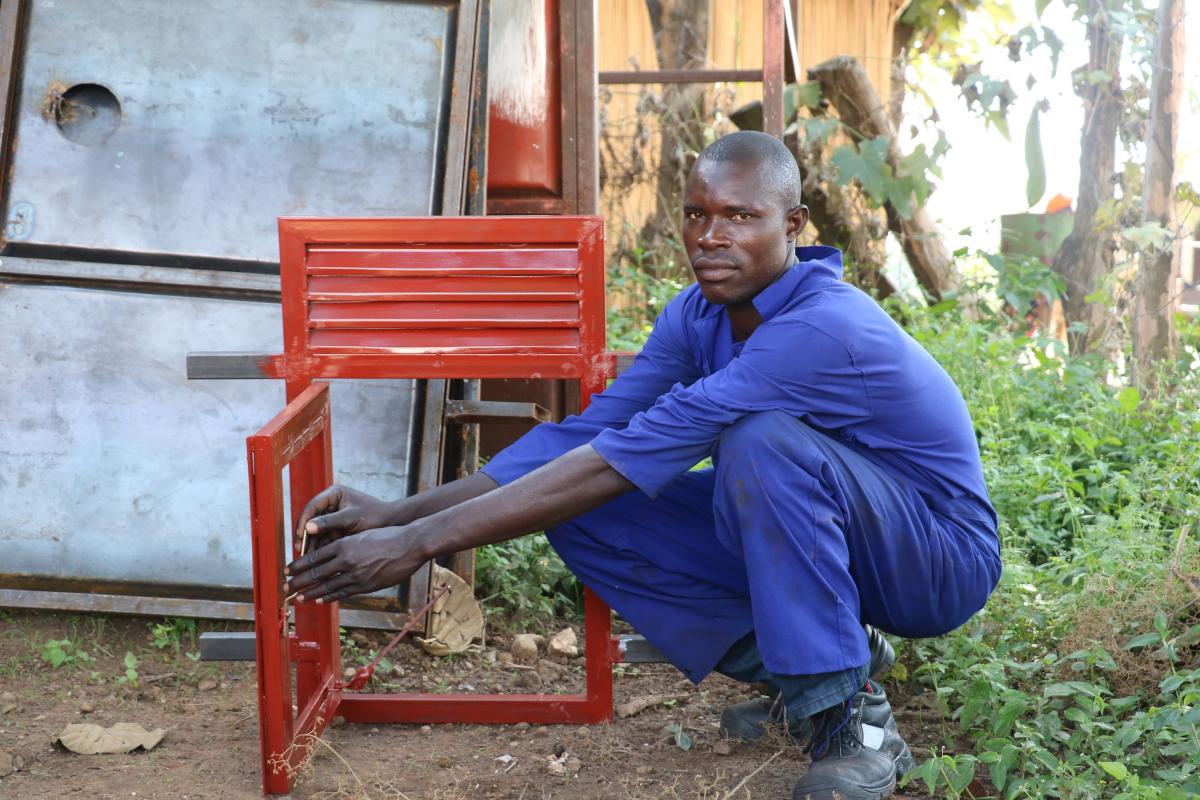
'My skills are my capital'
Sylvia NABANOBA | 16/10/2018
“I don’t have money to use as capital to start a business, but my skills are my capital.” This is 25-year-old Adam Abdu’s statement of faith as he prepares to graduate from Trust Metal Fabrication in Arua town where he has, for the last five months, been an apprentice, learning from a fabrication professional. Abdu is a Ugandan citizen who lives within Rhino Camp refugee settlement and has, since 2012, been out of school. During that time, he did not just sit at home. As a young man with a widowed mother and three young siblings, he felt he had to find a way of supporting the home. “I used to move around the village looking for building sites, where I offered my services as a mason or porter,” he says. “I did not know how to build, but I was willing to learn if someone gave me an opportunity.” Abdu got that opportunity and many more, and never looked back. He kept working on sites, learning and gaining experience. Part of his earnings supported his mother to take care of the home, while he locked up the rest in a bank account, to ensure that he was not tempted to waste them. Abdu’s willingness to learn as well as desire to make something of himself led him to the Centre for Governance and Economic Development (CEGED), a local NGO that had received a grant from Enabel, the Belgian development agency, to run a skills development course for youth. This was under the Support Programme for Refugees and Host Communities in Northern Uganda, funded by the European Union Emergency Trust Fund for Africa (EUTF). Rhino Camp refugee settlement is host to about 90,000 refugees from South Sudan. Uganda has become the largest refugee-hosting country in Africa following the escalation of conflict in South Sudan in July 2016. According to the United Nations High Commissioner for Refugees (UNHCR), about 1,037,898 South Sudanese refugees are registered in Uganda, accounting for 74.4% of the 1.4 million refugees Uganda is hosting as of January 2018. These are distributed among several districts in Northern Uganda, one of which is Arua. The increased number of people in the refugee-hosting areas has placed increased pressure on resources, including schools and employment. In Northern Uganda, formal employment in the region is often scarce, so Enabel, through the European Union Trust Fund, provides funding and expertise for skills training to enable refugees and Ugandan nationals living within the refugee settlements to get skills that can help them get jobs. This is in a bid to improve not only the refugees’ lives but also those of their hosts, something that will promote peaceful co-existence. Abdu’s experience on building sites played a huge role in his selection of what trade to take on. He chose Metal Fabrication and Welding. “Today people prefer metallic fittings to wooden ones,” explains Felix Anguyo, an instructor in Metal Fabrication and Welding at a youth skills training centre in Arua district. “This is mainly for security and durability.” So after the training, Abdu is ready to take on the world. He has skills in making windows, doors, balustrades, curtain rods, beds and many more. Once the training ends, Abdu will sit for examinations managed by the national Directorate of Industrial Training, after which he will get a Worker’s PAS (Practically Acquired Skills), a document that will help him get a job. Abdu would love to have his own workshop, be his own boss and manage his own income. Much as this is his dream, he knows that it cannot be just now. He understands that setting up a business needs money for paying rent, electricity bills, buying raw materials paying employees. He firmly believes that he has the most important thing in his hands – skills – and that will enable his dream of becoming his own employer a reality. “I am going to look for a job and become someone’s employee, but I won’t lose sight of my dream. I will save my money and one day run my own workshop. I want to be the leading professional welder in Arua,” he says. Abdu believes that the relationships he built in the construction industry will enable him get contracts for doors and windows. And that’s not the only dream that Abdu harbours. Having not had a chance to complete his education, he wishes better for his own children. “I would like my children to study up to university. I will also ensure that they learn a skill, so that if they do not get a formal job they can use that skill to earn themselves a living,” he says. Abdu hopes to train further, too. The Worker’s PAS that he will get will not only enable him to work, but to also upgrade his education. He can go on to attain a diploma and even a degree. The sky is certainly the limit for Abdu.
-
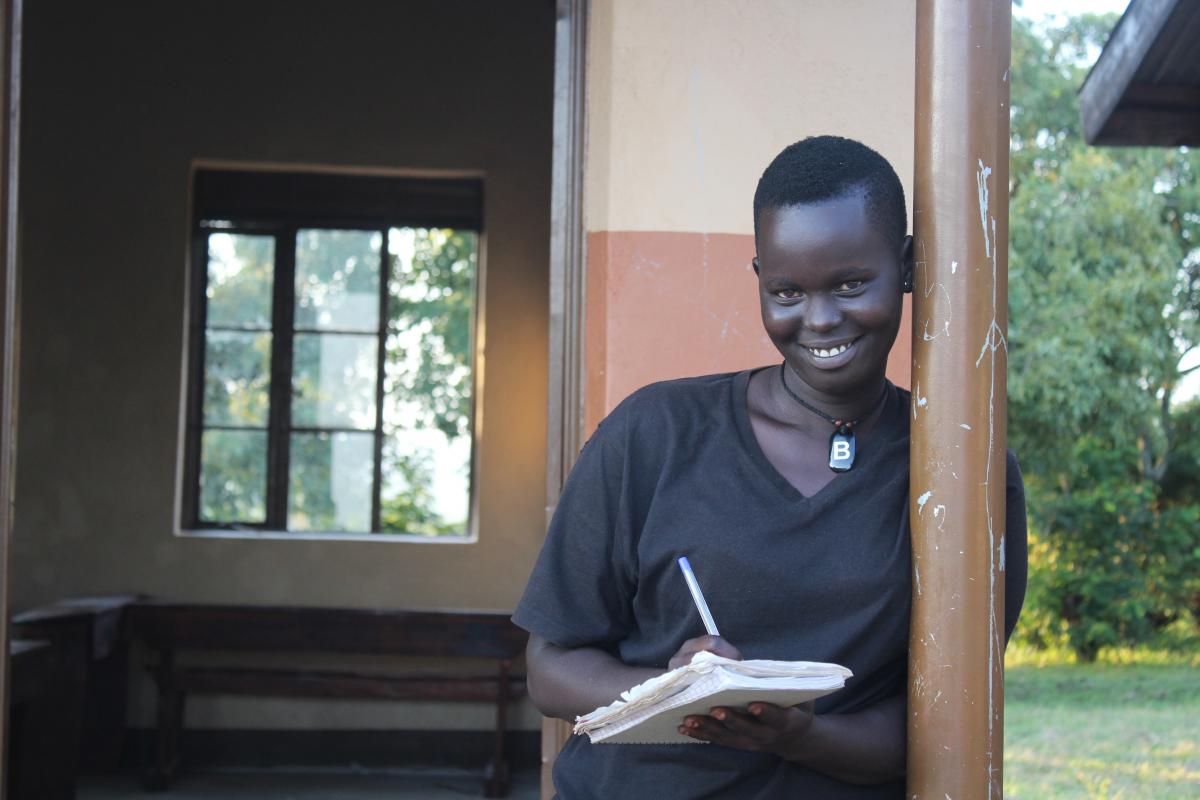
School girl aspires to become midwife to help pregnant refugee women
Sylvia NABANOBA | 16/10/2018
The sun is setting on the horizon, casting a soft orange light on the trees lining the compound of Lokopio Primary School in Bidibidi refugee settlement, Northern Uganda. Children stream out of one particular classroom. Their school mates left one and a half hours ago but the Primary Seven class, which is preparing for their Primary Leaving Examinations, stayed on for revision, just like they have done every day for the past few months. Clutching her books, 18-year-old Susan Sadia, a refugee from South Sudan, readies herself for the long walk home, a journey that will take her about 40 minutes. “I am reading hard so I can become a midwife,” she says. “I want to help the pregnant women suffering in the settlement, especially those who did not come to Uganda with their husbands.” Sadia knows only too well the suffering that refugee women endure. In 2016, she fled fighting in South Sudan with her aunt, cousins and siblings. The journey to safety in Uganda, on foot, across four rivers, some of which did not have bridges, took three days from their home in Yei. Besides the few belongings balancing on her head, Sadia had to carry her three-year-old brother on her back. Her mother had refused to leave South Sudan. Although she had been in school in South Sudan, in 2017 Sadia did not attend school in Uganda. Bidibidi, where she stays, is the largest refugee settlement in the country, hosting about 272,000 refugees, mainly from South Sudan. As with all other services, refugees have to share education facilities with the Ugandan nationals. Uganda recently launched an Education Response Plan for Refugees and Host Communities, against a backdrop of inadequate education services for children in those communities. According to the Plan, the number of children in refugee settlements far overrides the available schools, teachers and learning materials. In Bidibidi settlement, for instance, the pupil teacher ratio is 94:1, compared to a national average of 43:1. Sadia’s fate took a turn for the better in 2018. With funding from the European Union Emergency Trust Fund for Africa, Save the Children, an NGO, started the Accelerated Learning Programme. This is a catch-up programme that uses a compressed curriculum, over three years, to enable children who had dropped out of school to re-enroll. It is run within existing primary schools. Sadia is on the final year and has the opportunity to do the Uganda Primary Leaving Examinations which, she hopes, will be her ticket to secondary school and ultimately her dream of becoming a midwife. “I have seen pregnant women deliver from home because there is no one to help them. No husband to take them to the health centre,” she says. “When I become a midwife I will educate women on the need to go to a health centre to give birth, because that is where you find doctors and midwives who can help.” Sadia’s optimism belies the challenges she faces in the pursuit of her dream. The school does not offer meals for children, so those who stay nearby go home for lunch. “My home is far – I cannot afford to make the journey, so I only eat in the evening,” she says. Sometimes Sadia misses school because she has to take care of the home when her aunt, who sells food in the market, travels to stock up for her stall. She makes up for lost time by revising at night, efforts that are sometimes hampered by the lack of electricity in the settlement. The family’s solar lamp is now worn out and operates intermittently. But she is determined to pass her examinations, drawing inspiration from her family. “My parents did not go to school, so I want to be different. If I get a good education I will be able to help my family,” she says. With this determination, the women of Bidibidi, and later South Sudan, will be fortunate to get such a passionate midwife.
-
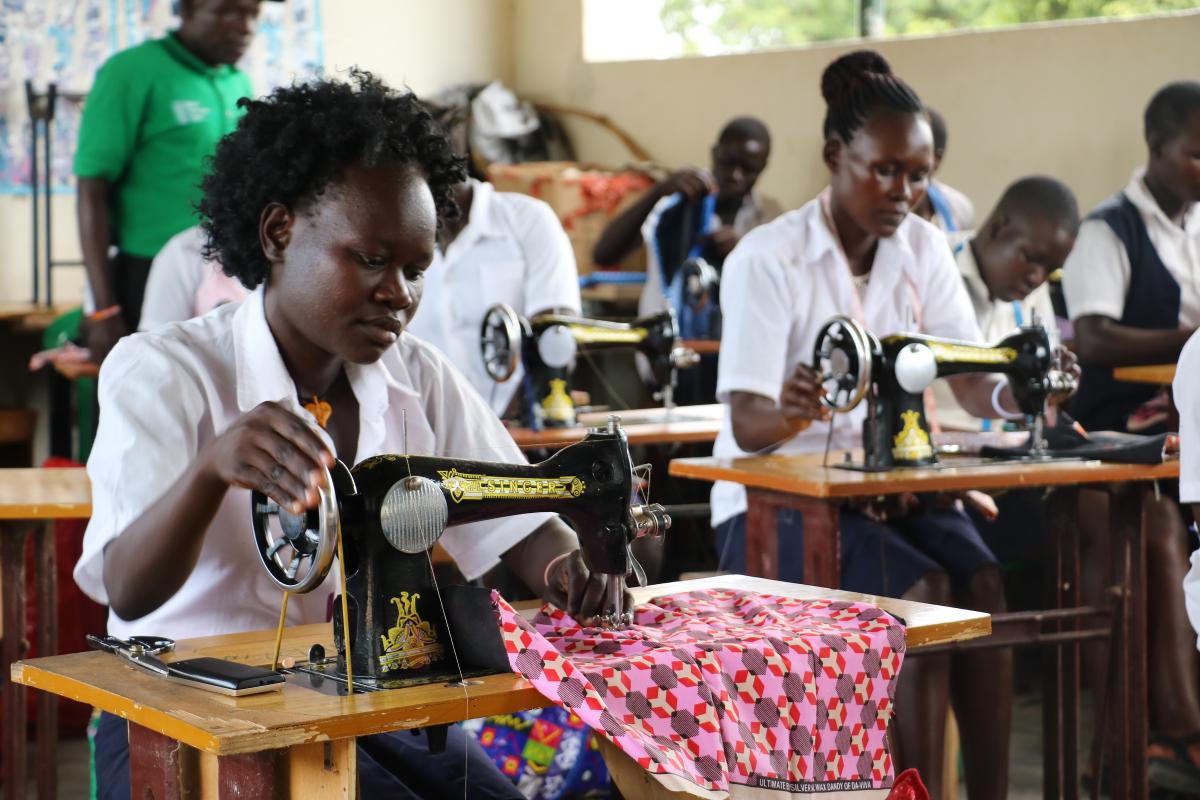
Tenisa sews her way to the future
Sylvia NABANOBA | 16/10/2018
Seventeen-year-old Tenisa Sabbath left her home in South Sudan in August 2016. Fleeing the rising insecurity in her village of Yei, Tenisa joined her elder sister and her husband, along with their five children and together they walked to the Uganda border. Vehicles did not risk the road, as armed men stopped them and robbed whatever little passengers had managed to take with them. A journey that would have taken a couple of days therefore took much longer because of the younger children. A widow, Tenisa’s mother refused to leave South Sudan, saying that she was too old and would be a burden on the way. In Uganda, Tenisa, who had been in secondary school back home in South Sudan, was not able to immediately join school. Since she had attained some level of education, it seemed only fair to let her younger nieces and nephews also get a chance to go to school. “My sister and her husband could not pay the school dues because they also had their own children to think of,” she says. In the primary school, students are required to pay UGX8,000 (USD2) each term as an examination fee, an amount that seems manageable to people in urban areas but not so for those in rural areas such as Rhino Camp refugee settlement. In addition, neither Tenisa’s sister nor her brother-in-law had a source of income, so they could not raise the money. Uganda currently hosts about 1.4 million refugees, 61% of whom are children. The Government endeavours to provide education for all children, including refugees, who are expected to be integrated into the Ugandan education system. While primary school education is more accessible for refugee children, secondary school provision is limited for refugees and host communities in the refugee-hosting districts. According to the Education Response Plan for Refugees and Host Communities in Uganda – 2018, access to secondary education among the refugee population in the refugee-hosting districts remains as low as 11%, with only 33% of these being girls. So for one and a half years, Tenisa could only help prepare her nieces and nephews to go to school, while she stayed home and played a motherly role. This changed one day when some girls in the neighborhood told her about a programme they were on – it was a free programme for children who had dropped out of school but wanted to re-enroll. She therefore enrolled on the final year of the Accelerated Education Programme (AEP). The AEP is a three-year programme that uses a catch-up method or accelerated curriculum to enable children who had dropped out of school to re-enroll and either be reintegrated into the formal education system or take up vocational skills training. Year one takes primary one to three, year two takes primary four and five while year three takes primary six and seven. Although AEP classes take place only in the afternoon, Tenisa was not a regular at school. “I loved studying, but did not attend school regularly as I still had to help in taking care of the home,” she says. So when she did the Primary Leaving Examinations (PLE), Tenisa did not pass well enough to join secondary school. This could be attributed to absenteeism, as well as curriculum differences. Schools in Uganda run on the Uganda education curriculum, a challenge that many refugees face, especially those who rejoin school in higher classes. However, all hope was not lost for Tenisa – she had two options, either to re-sit the PLE examinations or join a vocational skills training institute. She chose the latter and is now confident that that is the best decision she could have made. She is learning tailoring at the Youth Skills Development Centre in Siripi, Rhino Camp refugee settlement. She is one of 100 youth getting training in different skills, funded by the European Union Emergency Trust Fund for Africa. Tenisa is indeed sewing her way to her future, starting with the uniform she is wearing. “I sewed it myself. Each of us in the classroom had to make their own uniform at the beginning of the course,” she says excitedly. When training ends, Tenisa and her classmates will go for internship, during which they will be exposed to the practicalities of the business world. Afterwards they will do their national examinations and on passing get a Worker’s PAS (Practically Acquired Skills), a document that bears their qualifications and enables them to get work. Although the vocational training institute is privately owned and run, it collaborates with the national Directorate of Industrial Training, enabling its trainees to get the requisite skills as well as the necessary recognition they need to be able to work in the country. Life does not look as bleak for Tenisa anymore. She has hope – she knows that this skill will open the door to an independent life as well as a bright future. And if peace returns to South Sudan, she is ready to go back home and set up a life of independence and self-sustenance using the knowledge and skills she gained. “Skills do not rot,” she says. “What I have got here is something that I can use for the rest of my life.”
-
Promoting Active Teaching and Learning Through a Stimulating Environment
Dorothy KYAMAZIMA | 12/10/2018
Insufficient teachers, limited resources, inadequate infrastructure and the over-crowded classrooms are a few of the challenging factors affecting the education sector in Uganda. While a number of interventions are underway to improve the quality of education, focusing on new teaching methods and creating a stimulating environment can make a considerable difference. While access to education has substantially increased over the years, the declining quality of education is still a growing concern for many in Uganda. A large number of schools are afflicted with insufficient teachers, limited equipment and inadequate infrastructure to meet the needs of the growing classroom population. The Teacher Training Education (TTE) project set up by the Belgian development agency and the Ugandan government seeks to address this problem. The project aims at improving the quality of secondary teacher education in National Teachers’ Colleges by strengthening the professional competencies of future teachers and enhancing infrastructure.For quite a long time, teachers have relied on the traditional teacher-centered education styles where they are viewed as the information provider while students simply listen, memorise and take notes. This tactic has proven to limit the skills and knowledge development of students. However, accompanied by the fact that teachers are grappling with large numbers of students in a single classroom, limited teaching resources and poor infrastructure, the quality of education has been severely watered down. One of the main objectives of the TTE project is to improve the quality of teacher training by introducing a learner-centered approach to teaching known as the Active Teaching and Learning (ATL). This means that the learning systems shift focus from the teacher to the student and provoke independent reasoning, problem solving and critical thinking. Through ATL, students are more likely to retain a higher percentage of knowledge and skills because they engage with materials, participate in and out of the classroom and exchange information with their peers. ATL is improving learning in a way that benefits both the teacher and the student. Phionah Namutosi, a student from National Teachers’ College Mubende shared the experience.“During my time as a student, teachers were focused on exams and I found myself not understanding a lot of the subjects in the classroom. Right now with Active Teaching and Learning approach, lessons are more interesting and I gain so much more than before.” “This way of learning is more realistic than theoretical,” explains Nawuma Sarah, a mentor teacher at National Teachers’ College Kaliro. The students enjoy more when they are involved and in control of their learning. As a teacher, I have changed practice. I used to lecture to my students but now my role is to facilitate learning while using the different ATL methods, techniques and resources.” Ultimately providing better teaching methods is one way to improve the quality of education. In order to take a step further, a substantial investment has to be made on infrastructural support. This is because a conducive learning environment is key for optimal learning. Through the infrastructural component of the TTE project a lot of emphasis has been put on creating a healthy functional learning environment that enhances Active Teaching and Learning. The architectural designs and infrastructural set-up take into account several important factors that focus on innovation, sustainability, energy efficiency and the natural environment. Classrooms benefit from sufficient natural daylight and a well-designed cross ventilation sets off the higher tropical temperatures without any artificial intervention. The learning environment has been enhanced through the creation of spacious and flexible classrooms. These classrooms have electricity sockets installed in the centre to ease projector and computer use and writing boards and furniture that can easily be repositioned. This makes it easier for teachers to step away from the teacher centered approach and use ICT as an extra learning tool. Another contribution to improving ATL is the creation of outdoor learning spaces. This gives room and resources to both teachers and students to explore different learning techniques and encourages creativity.While classroom areas have been majorly considered, libraries have not been forgotten! Since libraries are the centre of learning, it made it quite essential to create an engaging learning environment. Innovations such as small working rooms for groups, wireless internet and availability of computers have transformed libraries in the National Teachers’ Colleges into a hub of knowledge with user-friendly facilities. Nawuma Sarah, a mentor teacher in NTC Kaliro shared her views on the new infrastructural developments. “The classrooms are quite accommodative now and this makes it helpful in creating learning centres and utilizing other ATL techniques. Most of our students are from a rural setting and provision of such facilities has given them an opportunity to learn more skills, carry out research and improve their learning process.” The new architectural developments have also gone as far as renovating and building more than education blocks in the Colleges. These include sports facilities, accommodation facilities and creating safe learning environments based on the different needs of the College staff and students. Infrastructure has played a big role in stimulating learning especially in the National Teachers’ Colleges (NTCs) where the project is reaching over 7,235 students through the first and second phase of the project. The second phase of the project is focusing on pedagogy for NTC Kabale and Mubende, while NTC Muni and Kaliro get special attention on accommodation for students and teachers. Construction designs are presently well underway in order to start construction by the end of 2018 and get completion by early 2020. Finally, the project is also setting up an infrastructural maintenance programme for all NTC’s including NTC Unyama which got infrastructure support from other donors.
-
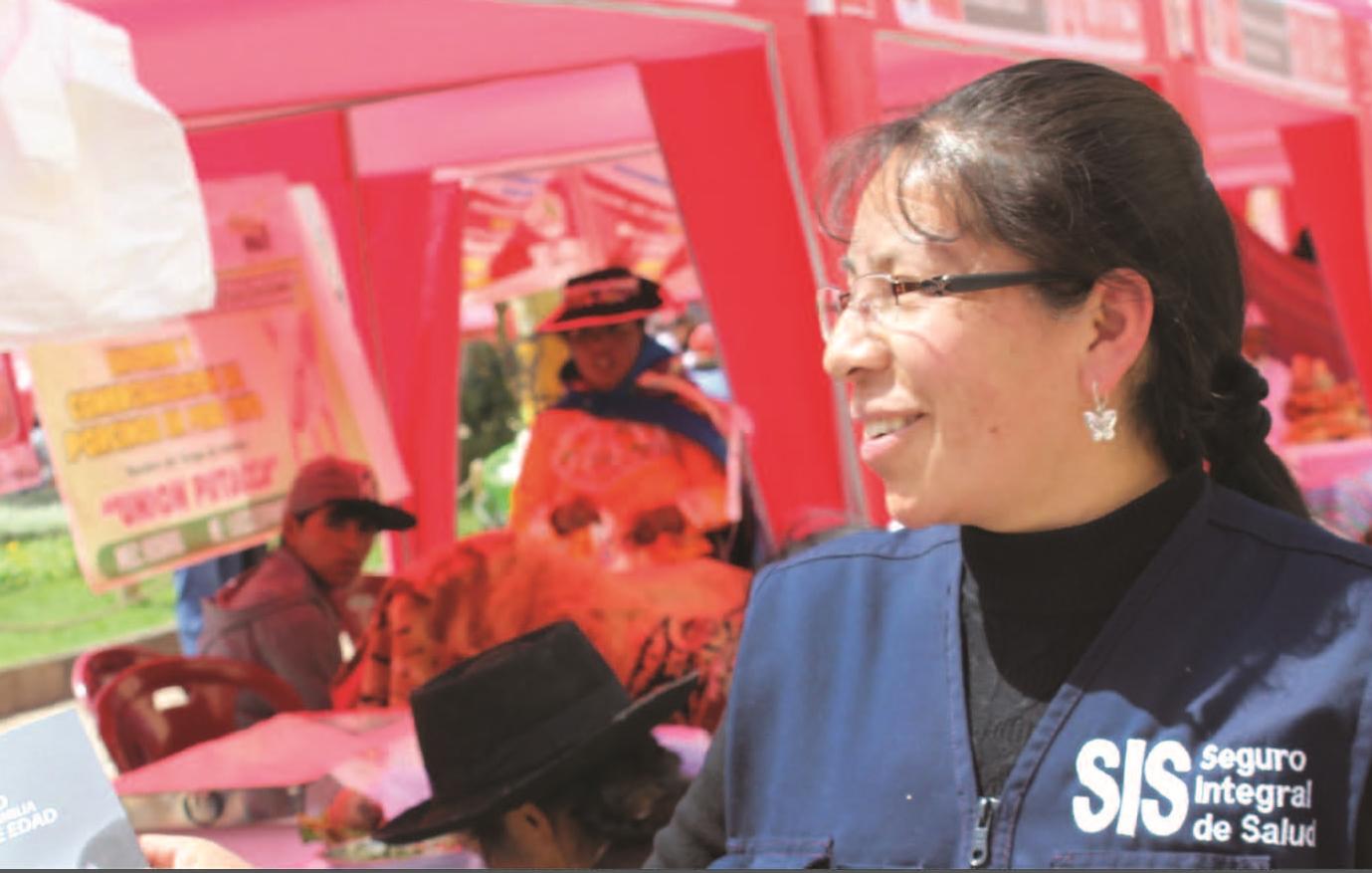
Más de 12.000 personas podrán ejercer sus derechos y deberes en salud en Huancavelica y Junín
Guido COUCK | 09/10/2018
El 26 y 27 de septiembre se desarrolló el evento de cierre del programa de apoyo a la política de aseguramiento universal en salud en el Perú en Saccsamarca (Huancavelica) y Layan Pata (Junín). El evento forma parte del programa de cooperación entre Bélgica y Perú en cinco regiones del país y a nivel nacional con el objetivo de mejorar los servicios de salud y el aseguramiento universal. Las regiones priorizadas fueron San Martín, Cajamarca, Piura, Junín y Huancavelica, zonas con población en situación de pobreza y pobreza extrema.De esta manera, hace dos años, en Huancavelica se dió inicio al programa de formación para formadores en derechos y deberes en salud y aseguramiento universal, como una propuesta para informar y empoderar a la población sobre sus derechos y deberes en salud, y brindar asesoría sobre las consultas y reclamos en relación al seguro integral de salud. Esta propuesta germinó y se empezó a implementar también en San Martín, Cajamarca y Junín.Durante el evento de cierre, Patrick Gaudissart, representante de la agencia belga de desarrollo, declaró: “En Huancavelica hemos trabajado muy cerca del Programa PAIS, quienes están más cerca a la población, así como el Seguro Integral de Salud, Susalud y otros aliados locales para lograr la sostenibilidad. En este evento queremos agradecer a todos ellos, quienes nos han permitido estos resultados.” En ambas zonas, como parte del evento, se realizaron sesiones de aprendizaje, donde los y las gestores lograron demostrar cómo se viene trabajando las réplicas. Estas réplicas han sido planificadas e incorporadas en sus planes operativos y permitirán llegar a casi 9000 personas en Huancavelica y 3500 en Junín, al finalizar el año.Este acercamiento permitirá llegar a población de las zonas más vulnerables y estrechar las brechas de afiliación y derecho a la salud, por ello se busca que el programa de formación desarrollado en la región de Huancavelica y Junín, sea extendido a nivel nacional.
-
La Formation en Alternance en faveur des jeunes, passerelle directe vers l’entrepreneuriat
Michael MALEMBA | 09/10/2018
Le projet pilote de formation en alternance initié par le programme, compte 188 jeunes étudiants issus de 8 Centres d’Applications (CDA). Cette expérience innovante se déploie en faveur des filières agricoles, vétérinaire, de transformation alimentaire et de mécanique générale. 8 entreprises issues des bassins d’emploi de Mbuji-Mayi et Ngandajika, ont permis aux futurs lauréats, de confronter leurs compétences pratiques dans le cadre d’une mise en situation réelle de travail. Les Unités Formation Emploi (U.F.E) adossées aux CDA, ont permis à ces jeunes désireux de se positionner vers l’auto-emploi, de bénéficier d’un accompagnement à l’entreprenariat visant la formulation de projets viables. 36 de ces lauréats sortants, encadrés par des artisans locaux, ont démarré les activités de 4 micro entreprises agricoles, de petit élevage ou encore de menuiserie. La formation en alternance a constitué un véritable passeport pour l’entreprenariat, permettant à ces jeunes d’acquérir les compétences techniques indispensables à la création d’une micro entreprise. La création de ces entreprises multipliera les espaces d’apprentissages propices à l’accueil d’autres jeunes dans le cadre de la formation en alternance et/ou en stage. Dès la rentrée scolaire 2018, le projet pilote de formation en alternance a redémarré en incorporant de nouvelles entreprises partenaires, passant ainsi à 10 conventions conclues avec le secteur privé. L’objectif est identique : accueillir, former et doter les jeunes apprenants des outils et compétences nécessaires pour une insertion professionnelle réussie. EQUIPE EDUKOR
-
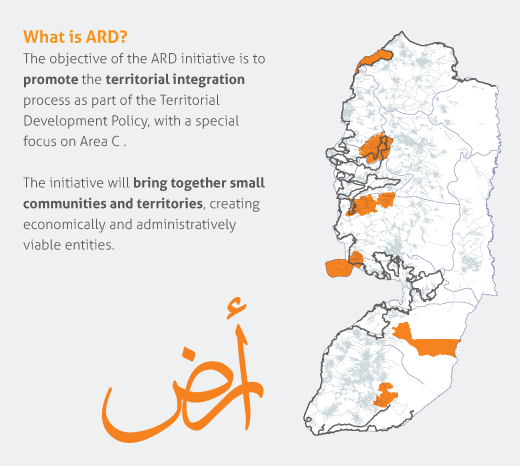
Launch of the Area Resilience and Development Initiative (ARD initiative)
Laura SCHILLEMANS | 08/10/2018
Enabel officially launched the Area Resilience and Development Initiative (ARD initiative), which is part of Local Government Reform and Development Programme. The grant agreement with the two remaining clusters (the Jorat Amra Joint Service Council in the Qalqilia Governorate and the West Bani Zeid Cluster in the Ramallah & Al Bireh Governorate) was signed. Now the program has agreements with a total of 6 clusters in the West Bank, of which three are supported by the EU and supervised by Enabel. The activities related to the agreements will be implemented until the end of 2019. The objective of the ARD initiative is to promote the territorial integration process as part of the Territorial Development Policy. The initiative will bring together small communities and territories, creating economically and administratively viable entities, to : implement, develop and deliver key local services in a more efficient and qualitative way; promote development and economic growth; improve local good governance; reduce disparities at all levels (social, cultural, inequities, capacities’ gap, etc); strengthen social dynamics and cohesion on that territory. This way the territory is not only seen as an “administrative space”, but also as a “space of development”.
-
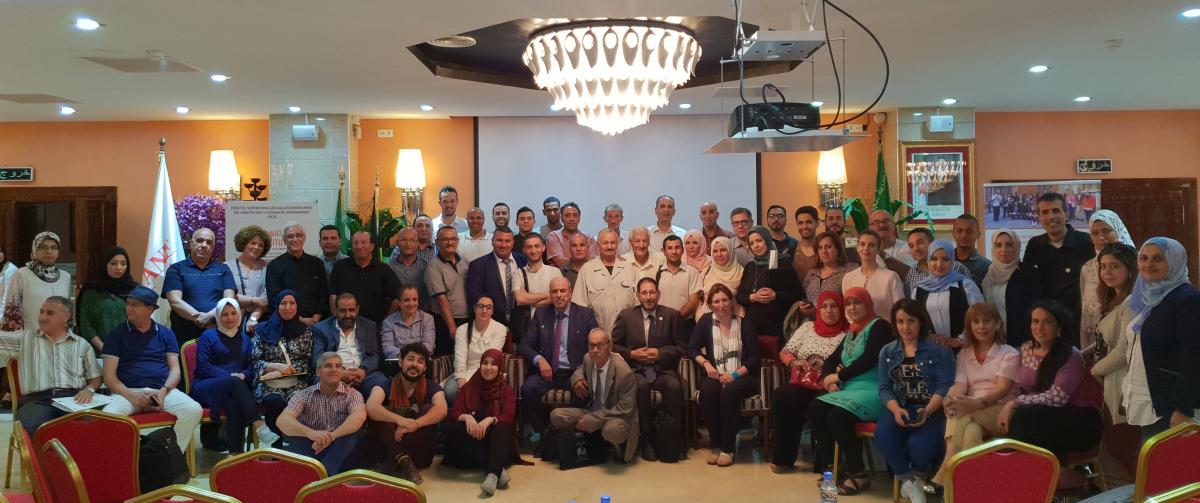
20 et 21 juin 2018 : Présentation et discussion de l’étude sur le rôle de la Société civile dans la préservation de l’environnement
Cherif AOUDJIT | 07/10/2018
Les 20 et 21 juin dernier, Madame F.Z. Zerouati, Ministre de l’Environnement et des Energies renouvelables et Monsieur P. Gillon Ambassadeur du Royaume de Belgique ont présidé le lancement d’un atelier national de présentation et discussion de cette étude financée par la coopération belge dans le cadre du projet PRCDE. L’étude, réalisée d’octobre 2017 à juillet 2018, avait pour objectif de réaliser un état des lieux et une cartographie des organisations de la société civile algériennes intervenant dans le domaine de l’environnement et de valoriser leur rôle en appui aux institutions publiques dans le domaine de l’environnement et du développement durable. L’atelier a permis une réelle discussion entre les OSC et les organismes publics. Plus concrètement, il a permis de valider et consolider les résultats de l’étude via des temps de travail en petits groupes puis sur des temps de partage en plénière. Grâce à un exercice de dialogue et d’échange entre les différents acteurs, il a également permis d’approfondir la réflexion et de tracer des pistes d’avenir sur 3 points essentiels de l’étude : - Les mécanismes de participation de la Société civile à la mise en œuvre des politique publiques, - Les partenariats qui pourraient être développés et les modalités du développement d’un travail en réseau pluri-acteurs, - Le financement des actions à entreprendre. L’atelier a vu la participation d’environ 130 personnes dont les représentants de 55 associations de la zone côtière, des hauts plateaux et du grand sud ayant participé aux ateliers régionaux pour l’élaboration de l’étude. Les principaux responsables du Ministre de l'Environnement et des Énergies Renouvelables (MEER) et des organismes sous-tutelle (OST) ainsi que des représentants des départements ministériels en lien avec le projet PRCDE (santé, transport, eau), des directions régionales de l’environnent, des universitaires et des personnes ressources tel que le CNES et des entreprises privées de recyclage ont aussi participé aux côtés d’universités, représentants du ministère de l’intérieur et des institutions de coopération. Présentation de l’atelier au journal de la télévision algérienne - en arabe (voir minute 22 :45) https://www.entv.dz/tvfr/video/index.php?t=JT20H_20-06-2018
-
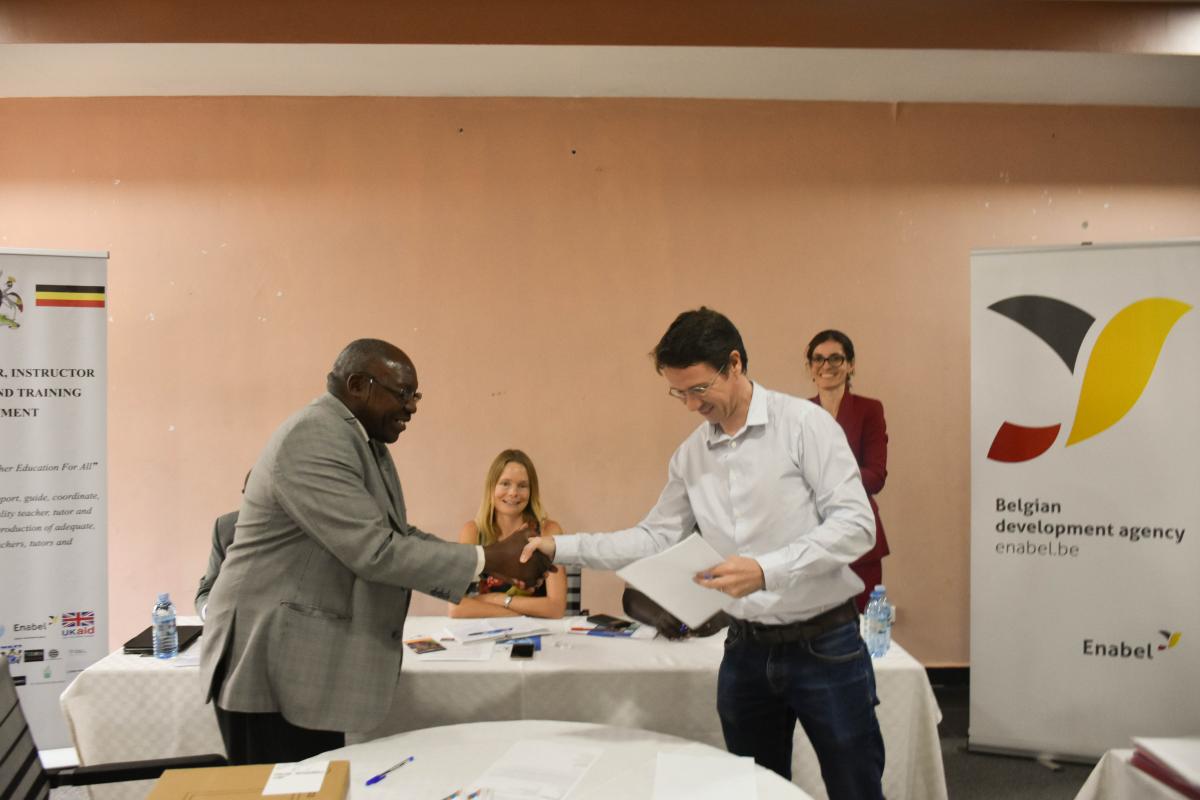
Enabel Extends Supports to National Teachers' Colleges
Dorothy KYAMAZIMA | 05/10/2018
While so many organisations and actors work to support the education sector in Uganda, Enabel takes a rather unique approach by focusing on teachers in the National Teachers’ Colleges. This is with a firm belief that the quality of teachers has a direct impact on the quality of education.National Teachers’ Colleges (NTCs) work with one common goal; to train and produce the best teachers in Uganda. Positioned across the country in Kabale, Kaliro, Mubende, Muni and Unyama, these colleges attract a large number of students hoping to join the teaching profession and become proficient teachers within country. However, just like many of the institutions within the education sector, these Colleges face quite a number of challenges that limit their ability to produce skilled teachers and these challenges range from limited resources, insufficient teaching staff to inadequate facilities. In order to create progressive impact within the education sector, Enabel is striving to empower teachers so that they in turn can carry the mantle of providing quality education for all. Under the Teacher Training Education (TTE) project, Enabel in partnership with the Ministry of Education and Sports has transformed the quality of teaching and learning by strengthening the skills of teaching staff on learner centred methodologies and supporting the development of user-friendly libraries. To encourage the use of Information and Communication Technologies, teaching facilities were furnished with ICT equipment such as computers, laptops, tablets, printers and projectors to improve the teaching and learning experience. While providing better teaching methods is a step towards improving the overall quality of education and one way of empowering teachers, the project has made substantial investment on infrastructure development. Over 263 teachers and 4,445 student teachers stand to benefit from the infrastructural developments that are aimed at creating sustainable and safe learning environments such as classrooms, laboratories and accommodation facilities. Amongst the most recent endeavours, is the award of new grant worth UGX 107,070,000/= million shillings to the National Teachers’ Colleges for the financial year 2018/19. This grant is intended to be used by the Colleges to strengthen their management systems and improve service delivery. Through these contributions, Enabel hopes to improve on teacher effectiveness and ensure that teachers are motivated, empowered and have the adequate learning aids and materials for effective teaching and learning.
-
Abilonino takes on Rabbit farming with a purpose
Rachael AYEBALE | 05/10/2018
Abilonino Instructors College had spent a substantial amount of money on procuring rabbits for training their agriculture students. Along the way, as the Support to the Development of Human Resources (SDHR) project conducted training needs assessments for the beneficiary organizations, they chanced on this opportunity and prioritized a rabbit production attachment for key stakeholders in the agriculture department."A needs assessment was done here at the college. Rabbit and fish farming were identified and a training was put in plan,’’ says Robert Kisoma, training officer on the SDHR project. “This was foreseen to link Abilonino to the community,” he addsAn attachment was then organised for 12 days to Cabral rabbit farm, Namayumba, Kampala and two key staff; the farm manager and the Agriculture lecturer were sent to acquire knowledge on rabbit farming after which an action plan was drawn. This plan included action points such as, setting up a rabbit farm unit, purchasing initial breeding stock, setting a demonstration farm, management of litter and others.“During the training, we learnt about different rabbit breeds and how to select them, rabbit structure formation and feeding, disease control and treatment, and many other things about rabbit farming,” Terence Omony, the Agriculture lecturer and training participant explains.Thereafter a proposal was drawn and presented to the college administration and it was seconded. This January 2018, the team proceeded to set up a housing unit where Enabel gave support in acquiring cages. They then procured 12 rabbits; 10 females and 2 males and currently have 30 plus rabbits.“This rabbit farm has been very essential in training students in modern rabbit farming practices,” Terence asserts. They hope to grow the farm to act as a demonstration farm for the students and neighboring communities as there as hardly any farmers rearing rabbits in the vicinity.“Rabbits are easy to keep, grow very fast and multiply easily. We hope to have over 500 rabbits in the near future,” adds Kenneth Ogwal, the farm manager. “It’s a good start. I commend the staff for implementing the knowledge they acquired,” Robert mentions.The farm boasts of 3 high quality breeds; the Giant Dutch, New Zealand White and Checkered. These were identified during the training as among the best breeds.Although a few challenges may be met, such as insufficient nesting boxes and housing unit the farm management is determined to face the challenges head on and find workable solutions to ensure the growth of the rabbit project.
-
Skilling health workers to improve service delivery in Yumbe District
Rachael AYEBALE | 05/10/2018
Crying babies sounds welcome us to Midigo health centre IV, one of the few health facilities in Yumbe District that offer maternity and ultrasound services to the public. In the next room, is nurse; Judith Adong carrying out an ultrasound scan on a heavily pregnant woman. About four more pregnant women await their turn just outside the door.Judith is seated on a high stool, dressed in a milk-white nurse’s uniform, with a shoulder badge. She is one of the beneficiaries of a long-term course provided for by Enabel under its project; Support to the Development of Human Resources (SDHR).We request a few minutes with her to gather her views in regard to the impact the training she has acquired has had on her work so far. And this is what she had to say. “I had been working in Midigo health centre iv, for four years, and in all those four years, there were ultrasound machines here but no one skilled enough to operate them,” Judith, smiling at the memory, intimates.“I came to take the course in Ordinary Diagnostic Ultrasound after a committee from the health centre sat down and highlighted the need for a nurse who could handle the ultrasound scanners. Like many health centres, the machines had been at the hospital for more than 5 years but there was no one to operate them,”she further adds.Midigo Health centre was identified as one of the centres in the district to benefit from the SHDR program and Judith was selected for a study in Mengo Hospital in Kampala in January 2017, for a six months training that ended in July 2017.“From the training, I learnt a lot to do with screening small parts,” she laughs softly; explaining that the term ‘small parts’ refers to breasts and the scrotum because they cannot be bundled up with the abdomen, for they hang out alone and are scanned out as a single organ each.“When I came back from the training, I was cleared to begin work. I started working in September, and I scanned around 50 patients just within that month of September. This was a much bigger number than before”adds Judith. When asked what has been most beneficial since the training, Judith raises her eyebrows briefly and narrates how the education she acquired was a new remarkable thing to her so far.“In school, we were taught about ultra-uterine fatal death; a dead child in the womb. It is one thing to learn theory it is another to see it in practice. The last scan I carried out and found a dead child in the patients’ womb was a really sad moment. But with my skills now, we encourage mothers to have regular ultrasounds to enable doctors to monitor their babies in the womb.”"Enabel has been a very good supporter, they catered for my wellbeing. My transport, and everything was done on time,” Judith further explains. “I achieved skills in general abdominal, obstetrical and gynaecological ultrasound scanning. I was also introduced to ‘small parts’, doppler principles and basic ultrasound in tropical disease. This has helped me bridge the gap in Midigo health centre. There was no sonographer and now I am the only sonographer at the health centre,” she states with triumph.Her Message to young women“Medicine is a very good profession, you will learn a lot. You will learn something new in your life, it is a very interesting profession.”
-
Drug stock outs a thing of the past for Holy Family Hospital Nyapea
Rachael AYEBALE | 05/10/2018
Holy Family Hospital Nyapea is located in the depth of the new Zombo district and has been in existence for over 31 years. This health facility is historically a private not for profit health facility serving the community under the Catholic church. Being nonprofit poses major challenges in running the facility such as, financial inadequacy, inadequate infrastructure, human resources skills gap, drug supplies management and others.Of the above challenges, improper drug supplies management was stifling the facility with drug shortages thus the hospital administrative team decided to sit and review the issues and found that, drug handling personnel lacked proper that led to major stock outs of essential drugs, and thus when the Support to the Development of Human Resources project was carrying out a needs assessment, the hospital administration quickly grabbed the opportunity and prioritised a Supply Chain Management training to assist them close the gap.The training was attended by 17 staff; managers, mid managers and drug handlers in all departments. “After the training we drew an action plan to address our challenge, clearly indicating the action point, performance indicator, and timeline for implementation”, affirms Dr Jammy Omara, a medical officer at the facility and training participant. “I must say the training registered a success as you shall see from our performance indicators” he adds.The facility has been able to adopt a Vital Essential Necessary (VEN) system with a list of essential drugs classified along the system. This system greatly assists in determining what drugs are purchased to avoid waste of resources.Unlike in the past when drug orders were uncalculated, now orders are only made for essential drugs. The facility is now able to calculate daily and monthly consumption from the store in a timely manner.Storage of drug has also greatly improved. All drugs are now labelled in the store and organised. They have also acquired shelves, some lockable to better store and protect drugs.They have formed a therapeutic committee that analyses drug usage, cost analysis reports, benefits analysis for drug accountability purposesDr Mark Bramali, also a medical officer and participant in this training confirms that they have been able to reduce drug stock outs to 11% from 36%. He asserts that even the 11% would be much less if it weren’t for situations beyond their control such us delayed delivery schedules of the suppliers.To further address the issue of drug stock outs, they now order for essential drugs that are running our early enough, as early as 2 weeks to stock out in projection of the ones in the store. Thus they have been able to save about 14 million per year on drugs wasted, which to a facility that operates on a very small budget is substantial money.Kafeero Ibrahim, a registered nurse and participant of the Supply Chain training confirms that there has been a great improvement in drugs storage, drug stock outs have reduced significantly, there is now prioritisation of drugs procured, and dispensing log books are now in place and regular updates of drug stock cards to estimate drug usage.In conclusion, Dr Jammy mentions he on behalf of Holy Family hospital Nyapea is very grateful to Enabel for helping them close this gap that was stifling their facility.” We are glad Enabel did not force a training on us that may have perhaps been irrelevant to our needs. They came and assessed our needs and gave us an opportunity to identify and prioritise our own needs that we urgently needed training in. The trainer brought us did not disappoint and Holy Family Nyapea hospital is now on track as far as stocking essential drugs is concerned.’’
-

Volet Institutionnel du Programme d’Appui au Développement des Filières Agricoles: Des bases jetées pour assurer la pérennisation des stratégies, méc
Reece-hermine ADANWENON | 04/10/2018
Septembre 2019 consacrera, la clôture du Programme d’Appui au Développement des Filières Agricoles (PROFI) Volet Institutionnel (VI). En prélude à cette clôture imminente, les différents acteurs se sont réunis à l’Infosec de Cotonou ce Jeudi 04 octobre 2018, pour élaborer la stratégie de sortie afin de s’assurer que les stratégies, mécanismes et outils qui ont été développés au cours de cette intervention soient valorisés et pérennisés. Tous les partenaires Limitrophes (PALI) ayant bénéficiés de l’appui du Volet Institutionnel du Programme d’Appui au Développement des Filières Agricoles (PROFI) ont été associés à cette démarche de capitalisation et de pérennisation des acquis du PROFI-VI. Initié par l’Agence belge de développement Enabel au Bénin, depuis Octobre 2014, le Programme PROFI avec son volet institutionnel permet de renforcer les capacités institutionnelles, organisationnelles et individuelles des acteurs impliqués dans le développement agricole au niveau national et déconcentré. Au cours des échanges qui ont duré toute la journée de ce jeudi, les participants auront à apporter leur contribution à la validation de la stratégie de sortie à travers la prise de responsabilité afin de garantir la pérennisation des différents acquis de l’intervention. Selon Mr Emmanuel ZINSOU, Assistant du Secrétaire Général (SG) du Ministère de l’Agriculture, de l’Elevage et de la Pêche, représentant la SG, ces assises permettront aux participants d’apprécier les propositions qui seront présentées par l’équipe opérationnelle du PROFI-VI dans le cadre de la stratégie de sortie notamment les mesures à prendre en termes d’organisation des ressources humaines et de mobilisation des ressources financières au titre du budget 2019 afin d’assurer la poursuite de certaines activités. Elles permettront également aux différents acteurs de s’imprégner de la proposition de planification opérationnelle pour l’année 2019 du PROFI-VI dans la perspective de son achèvement prévu pour Septembre 2019. A en croire Mr Emmanuel ZINSOU, l’appui institutionnel implique tout un changement de paradigme comportemental. A ce propos, son plus grand souhait est de voir tous ces acquis, tous ces produits, outils bien utilisés dans les pratiques quotidiennes. Il a exprimé sa profonde reconnaissance à l’Agence belge de développement (Enabel) pour tout l’accompagnement et les divers appuis apportés au Ministère de l’Agriculture, de l’Elevage et de la Pêche (MAEP) pour le renforcement de son leadership dans la coordination du secteur agricole, l’accompagnement à l’opérationnalisation des réformes et également le développement des filières riz, maraichage et l’anacarde.
